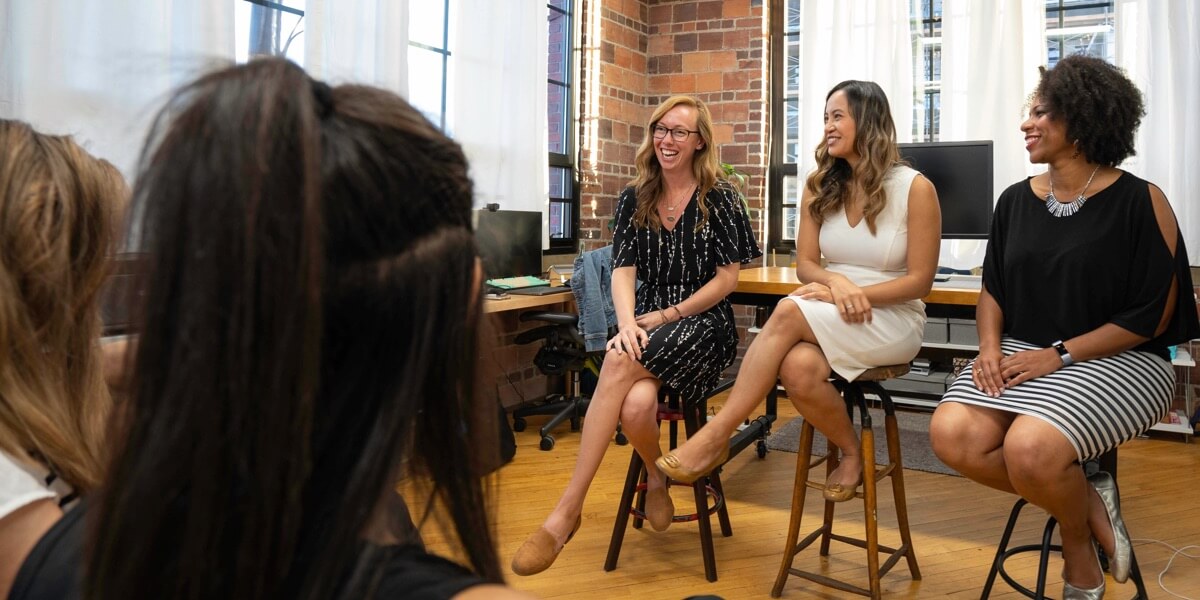The Path profiles people working in what we think of as "dream jobs," living their best professional life, and looks at the people and practices that helped get them there. We talk to these amazing folks about how goal setting, great managers, tough conversations, and key moments of praise helped set them straight or lift them up at instrumental moments and take them where they are now running the show.
Reddit, which calls itself “the front page of the Internet,” is one of the buzziest social communities on the internet. Boasting approximately 430 million Reddit users, or "redditors," as of 2018, the platform is all about curating community spaces based around people's interests. But, just as important as the services that the company offers to its online users is to its success, so too is the ability to create a stellar employee experience within the company itself. And that's where Michelle Lozzi comes in.
Michelle is the Director of Experience at Reddit, where she leads the company's employee engagement through activations both inside and out of the workplace. After initially studying to become a teacher, her passion for people and education led her on a path that eventually led her to become a driver of culture and change at a massive tech company.
From being a restaurant server as a student to a special needs aide at a high school, Michelle has learned the importance of saying yes to new and diverse opportunities and being able to put herself in others’ shoes to understand their needs. While working in a customer service role at her previous company, Michelle set her sights on being in a role that influenced employee experience — from the atmosphere where they spent their days to the events that connected them to one another. Today, that’s exactly what her job is all about.
Here, Michelle opens up about what it means to put her ego on the backburner, to have someone take a chance on you, and why trust is at the root of everything.
What did you go to school for? What did you think you wanted to do when you were younger?
I studied history in school with the idea that I would become a history teacher. What I could have never imagined were the many ways I use my interest in history for my career now, which is far from the classroom setting I envisioned myself working in. But utilizing the study of social movements and the constructs of society has really impacted how I help drive culture and change through observing and highlighting the DNA of our employees.
How did you end up getting hired for the position you’re currently in?
I started my time at Reddit in a workplace manager role that was largely focused on facilities and workplace design. I actually took a step back in my career trajectory to work for Reddit. It was a calculated gamble, and it paid off in so many ways. As the company grew in size, so did the need to scale culture, and the scope of my role and responsibilities. I grew the focus of my team from workplace to experience, which involves global real estate, internal events, external events, facilities, and more.
Tell me about someone who’s made a significant impact on your career trajectory—whether that’s a mentor, a manager, or someone else crucial to your success.
I’ve been very fortunate to be surrounded by so many badass people who have supported and endorsed me throughout my career, but two people come to mind with equal contributions. My former manager, Katie, helped me learn how even the smallest task can directly impact the overall success of any program, project, event, or major initiative and that the slightest detail can make or break an experience.
My current manager, Katelin, has taught me the importance of boosting others. More than a manager, Katelin has also been an executive sponsor for me and my work and challenges me to analyze how I approach certain situations or circumstances. She has demonstrated to me the positive impact a good leader can have on someone else’s success.
What are some daily habits you absolutely make sure to schedule into your day?
I make sure to stop and grab a coffee every day on my way to work! It’s a ritual that gets me in the right frame of mind to take the day on, no matter what gets thrown my way. Also, one of my favorite parts of the day is when employees gather in the kitchen to grab breakfast. In my own upbringing, meals have always been a way for my family, friends, and me to connect and take some time to get to know each other. I apply that same approach to colleagues, so having a moment with someone I don’t always get to interact with is invigorating.
What do you love most about your job?
I love creating experiences for people that leave them feeling empowered, inspired, and engaged! People spend the majority of their time each week in the office and interacting with colleagues at work. My team is responsible for creating opportunities to make sure all of our employees love where they come to work every day and feel enabled to be successful.
Has there been a time when someone took a chance on you? Do you think it’s important to take chances on others?
I frequently tell the story of when I was referred for a job by a friend and the recruiter told me I wasn’t qualified for the role because of my experience. It was disheartening because I knew I could do the job if I just had a chance to prove myself. I didn’t get the role then but then, a few months later, a different recruiter was assigned to fill the role. My friend referred me once again and this time, the recruiter put me in front of the interview team and I received a job offer. This was a pivotal moment in my career because it showed me that resilience and persistence pay off. But it also showed me the importance of looking beyond a resume or a first impression.
To me, it is incredibly important to take a chance on others. Had that recruiter not looked beyond my work experience as it directly related to that job, I would not have had the career path that put me in the role I’m in today. I keep that with me when I’m interviewing for a new hire or looking at my team to evaluate career growth and opportunities. The fact that someone has not done that specific job before doesn’t mean they won’t be able to do it if given the opportunity; if you are in a position to afford someone the chance, why wouldn’t you help someone realize their potential?
How do you integrate critical feedback and praise into your work?
While it’s obviously harder to take critical feedback than praise; none of us got to where we are without the input of others. So, in my mind, I feel grateful to those who invest their time to make me better at what I do and always welcome feedback about my work.
When managing others, I am very aware of what feedback can do for an individual if communicated correctly, and keep that in mind when reviewing work with my team. I try to help my team take the constructive feedback in stride while also recognizing all of the achievements with each curated experience, as well. Even in areas where we can potentially change something in the future, I don’t want my team to feel discouraged by a suggestion for improvement.
What’s been the biggest learning lesson in your career so far?
While cliche, that hard work will always pay off. My mom was a single mother of three, always worked her ass off, and never complained about it. I developed my work ethic from her at an early age and as I’ve applied those same foundational principles to my work, I’ve accomplished so many things. My mom showed me firsthand how to use adversity as motivation to succeed rather than slow you down. Of course, there are times when things get overwhelming, but I have created amazing opportunities for myself because of my dedication to producing good work.
Tell us about your first experience as a manager. What have you learned since then?
When I first began managing, it was very difficult for me to have a tough conversation with my direct reports because I didn’t want to be seen as “mean.” I have learned that it’s incredibly important to talk about “the why” behind constructive feedback so my team knows the reason for the difficult conversation. One of the things I respect and treasure most about being a people manager is my commitment to someone else’s career. I have learned to put others’ development before my own ego.
What do you think makes a good leader?
One who shows up for their team and establishes a culture of trust. It’s someone who takes their role seriously, sets a good example of hard work, and is also thoughtful with others’ growth and development. A good leader holds themselves to the same expectations they have of their team and delivers against them, rather than demanding one-sided output, creating a space where everyone feels inspired to do their best work together.
When establishing a culture of trust, I think the most important thing to remember is that we’re humans before anything else. When you prioritize the fact that we’re all unique people with different interests, work styles, and personalities, you allow for the individuality of each team member to coexist. I encourage my team to feel at ease in expressing themselves, laughing together, enjoying each other, and not losing sight of who they are even though we’re at work.
How do you approach difficult conversations with your team and other colleagues?
First and foremost, with respect. I always try to approach them with the end-goal at the forefront of my talking points, knowing that the point of the conversation is to help someone improve. I put a lot of thought and preparation into these conversations because I respect the fact that these are not fun and I also care deeply about each individual’s development. More than anything, I commit to being honest with my team.
Has goal-setting played into your career?
I have done less around setting specific timelines with myself for achieving my goals and focused more on the act of accomplishing what I want to do. I prioritize feeling fulfilled in my work and not behaving against my own beliefs. By doing this, I have found that I can still reach the goals and accomplishments I set out to do without compromising who I am and how I want to get there. I work hard and try to constantly improve myself, all while keeping my eyes open for new opportunities that may be presented to me.
What do you think managers and leaders need to be doing to create better workplaces?
I have found that one of the major factors that keep employees engaged is their relationship with their manager. No amount of perks or “fun” that so many companies rely on will correct engagement if an employee doesn’t feel safe in their working relationship with their manager. I try to encourage my team to feel comfortable with having open communication and often ask them directly for feedback on what I can do better as a manager.
What advice would you give to your younger self?
Embrace exactly who you are and be your genuine self. Everyone is unique in their own right and has a place in this world. Have the confidence that your perspective is valuable, and you’ll be happier and more successful because of it.







